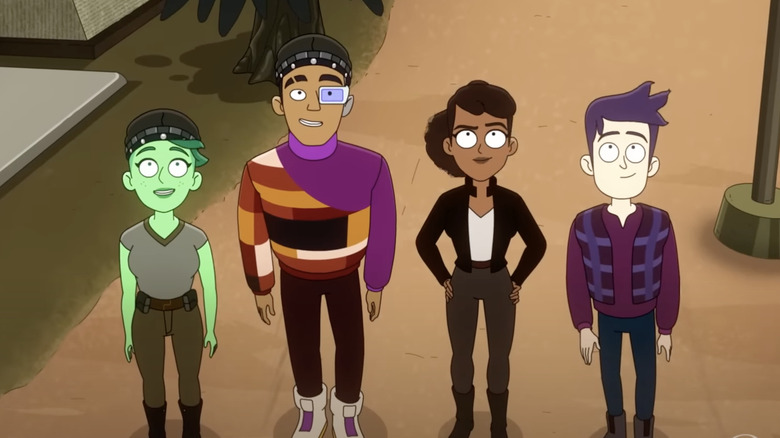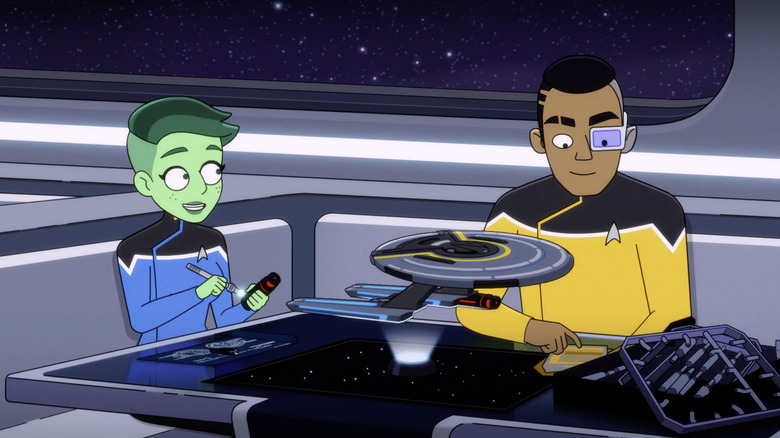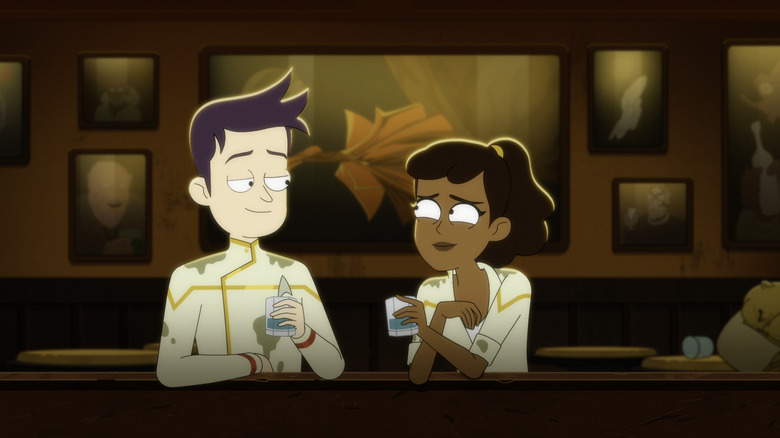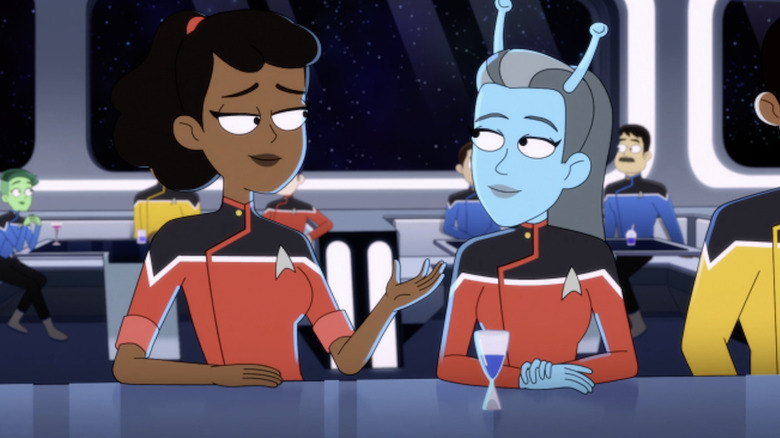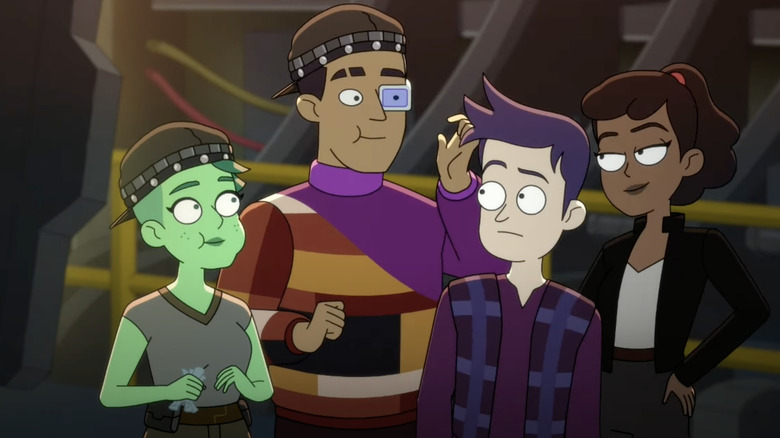The Creator Of Star Trek: Lower Decks Has Mixed Feelings About Crew Member Romance
The third season of "Star Trek: Lower Decks" is rolling out on Paramount+, and by this point, we've come to know and love the ragtag U.S.S. Cerritos crew and their interpersonal dynamics very well. While Mariner and Boimler are no stranger to zany misadventures, the animated series has most successfully hooked us on its characters by focusing on a slice-of-life, intimately mundane side of the futuristic universe. What do crewmates do in their spare time? Who sits with who on lunch breaks? There's something to "Lower Decks" and its domestic, workplace comedy tone that allows the audience to see the world of "Star Trek" in a way that feels reminiscent of fanfiction.
Within a fandom so old and so historical to the concept of "shipping" itself, it's no wonder that fans are so invested in the romantic endeavors of our scrappy ensigns. For showrunner and series creator Mike McMahan, however, exploring the romantic lives of his characters is something he has a lot of complicated feelings about.
Tendi and Rutherford's romance is not a huge priority
In a recent interview with Fangirlish, McMahan was asked about Tendi and Rutherford's relationship and if there was any chance of them getting together:
"Gosh, I hope so! They seem so compatible. They're so sweet! They both love engineering. You know, here's the thing. If you ask me, 'Will Tendi and Rutherford ever repair the warp core together?' I'd be like, 'F*** yeah, absolutely, can you ever imagine them not?'
But you know, there's something about...there's clearly a deep friendship between them and maybe something more. But because they're the Geordi and Data of the show... it's [more about] their friendship and learning about themselves, and Tendi trying to become a senior science officer, Rutherford both becoming a better engineer and learning who he was and that there was a part of him that he didn't know was hidden... like those things are almost more important than their romance with each other."
While it's clear that McMahan has no personal objections towards the idea of Tendi and Rutherford being together, it just seems as though pairing his characters together in a romantic fashion is not something that is on his mind when he's developing the show's story. McMahan feels most interested in the fact that these characters are paired together to bring out the best qualities within each other, so that their companionship can lead to growth as individuals.
Mariner and Boimler explore co-dependency in friendships
When one zooms out and reflects on how the show has always addressed romance, this actually proves to be a consistent philosophy on how all the popular relationships are written on the show. One episode in Season 2, "An Embarrassment of Dooplers," focuses specifically on the dynamic between Mariner and Boimler, one of the show's core relationships (and the show's pairing with the most fics published on AO3). While the episode directly acknowledges the deep bond they have and how they can be read as a couple to outsiders, the episode concludes on a very platonic note — the two drinking together on a night out at Kirk's bar.
When stars Tawny Newsome and Jack Quaid were asked about Mariner and Boimler's relationship, they were candid about how the writers and cast collectively feel about it. Newsome definitively answered:
"No, this is not a 'will they, won't they?' This is a 'they won't, let's continue from here.' There's still enough weirdness in the friendship, and there's enough codependency that I think is so amazing to explore that adult friendship that gets too close. It is never in any way romantic, and I think that's important for everyone to know that no one wants that."
In all fairness to those who ship Mariner and Boimler, McMahan and the writers of the show's philosophy on de-centering romance in "Lower Decks" even extends to the canon relationships of the show.
Mariner's romance plot in Season 3 is more than meets the eye
Mariner's parents, Captain Freeman and Admiral Freeman, do not share a lot of screen time together and not much about their relationship can be gleaned from the time we do see them. The tradeoff, however, is that the show gets to spend a lot of time focused on Freeman and Mariner's mother/daughter relationship, a core thread of the show.
In season 3 of "Lower Decks," Mariner has a new girlfriend, Jennifer the Andorian. Last season, Mariner finally opened herself up to Jennifer in a moment of self reflection, and she's been slowly letting herself get close to someone again. It's a big step for Mariner's emotional maturity, and while there are moments in the new season that delve into their relationship, it's once again more of a supporting element to Mariner's character development than it is the main idea.
In an interview with Gizmodo, McMahan elaborated on this thread:
"In the third season, she and Jennifer are seeing each other and there are stories we tell about that. What I would say is it's not easy to date Mariner, and this show really is not about Mariner's romantic relationships. It's about how she sees herself, and how she treats friends and colleagues more than romantic partners... you will see Mariner and Jennifer dating, and see how that affects her, but really the tectonic shift that's going into [Mariner's arc in season three] is, right when she opened herself up and everything was going great, it all gets taken away from her. How does that affect somebody who doesn't like it when people leave her or are taken away?"
The futurism of Star Trek is found in its various platonic bonds
"Lower Decks" contains multitudes. It's silly, adventurous, and at times, even quite crass — but it never loses sight of its characters and how to keep raising their emotional stakes. This is ultimately what helps the show, despite its unique tone it imbues within the sci-fi setting, still feel like "Star Trek." McMahan further told Fangirlish: "What it really comes down to is that 'Star Trek' isn't really about romantic relationships to me. It's about colleagues and respect and being on a crew together and best friends."
McMahan certainly has a point there. While that isn't to invalidate your favorite ships or even argue that they couldn't possibly happen, the futurist beauty of "Lower Decks" is that these characters are allowed to have deep, platonic bonds whether they are men, women, or any other organic being.
